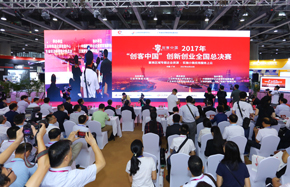Yantai unleashes potential of Belt and Road Initiative
China’s Yantai has made significant efforts in recent years to improve its infrastructure in order to build the city into an important trade and economic center with the backing of the Belt and Road Initiative.
As a key city along the route of the ancient Silk Road, Shandong’s Yantai has many advantages to complement the Belt and Road Initiative, including its advanced transportation system, and advanced state of reforms and opening-up.
“Yantai is a city full of vigor along the route of the Belt and Road. As one of the first batch of 14 coastal cities which implemented the policy of reform and opening-up, Yantai must now continuously expand its industry abroad,” said Li Ming, administrative vice-director of Yantai publicity department.
“Yantai has now established relationships with 64 countries along the route of the Belt and Road,” Li said.
“By the end of 2016, Yantai had invested in 139 projects in 28 countries in the areas of infrastructure, energy and food processing. The investment value amounted to 1.1 billion yuan ($14.7 million),” he added.
In the first quarter of this year, the number of cooperation projects with countries along the route of the Belt and Road reached five, two more compared with the same period last year.
In terms of opening-up, Yantai has made every effort to build overseas economic and trade cooperation zones (OETCZs) and encourages local companies to expand businesses in countries with rich resources and bright prospects.
In these OETCZs, Yantai will build industrial parks and economic and trade platforms. So far, China has 20 national-level OETCZs, of which, two are headed by Yantai firms.
The two OETCZs are the China-Hungary trade and economic zone which received investment from Wanhua Chemical, and the China-Russia timber trade cooperation zone which received investment from Avic Forestry Co Ltd.
Yantai’s government has always encouraged local businesses to attach great importance to innovation and cooperation. Local firms are urged to develop innovation platforms, set up sales networks abroad and cooperate in energy and project contracting.
The Belt and Road Initiative will strongly promote development of Yantai’s local businesses, especially energy firms.
“Our company’s main growth point lies in the longest economic corridor in the world,” said Shi Haijiao, international business promotion manager of Jereh Group.
“Jereh has developed energy projects in 63 countries and regions and established institutions and offices in more than 50 cities,” he added.
“We have businesses in countries along the route of the Belt and Road, including Russia and Pakistan. We have also set up sub companies in Kazakhstan and signed strategic cooperation agreements with the Kazakhstan Oil Geological Prospecting Institute,” he said.
“We welcome Chinese companies, including Jereh Group, to invest in Kazakhstan. The examples of business cooperation under the Belt and Road Initiative have attracted a lot of media attention in Kazakhstan,” said Serik Korzhumbayev, chief editor of a large media organization in Kazakhstan.
Yantai now has strong trade connections with countries along the route of the Belt and Road. In 2016, import and export values totaled 52.6 billion yuan with 64 countries involved. In the first quarter of 2017, import and export values with countries along the Belt and Road hit 11.9 billion yuan, an increase of 18.4 percent.
Yantai plans to make great improvements in infrastructure as well as international production capacity cooperation and equipment manufacturing in the next 10 years, so as to build itself into an economic and trade hub along the Belt and Road.















